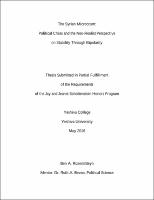Please use this identifier to cite or link to this item:
https://hdl.handle.net/20.500.12202/3999Full metadata record
| DC Field | Value | Language |
|---|---|---|
| dc.contributor.author | Rozenshteyn, Ben | |
| dc.date.accessioned | 2018-10-18T16:22:13Z | |
| dc.date.available | 2018-10-18T16:22:13Z | |
| dc.date.issued | 2016-05 | |
| dc.identifier.uri | https://hdl.handle.net/20.500.12202/3999 | |
| dc.identifier.uri | https://ezproxy.yu.edu/login?url=https://repository.yu.edu/handle/20.500.12202/3999 | |
| dc.description | The file is restricted for YU community access only. | en_US |
| dc.description | The file is restricted for YU community access only. | |
| dc.description.abstract | The 70th Regular Session of the UN General Assembly (UNGA 70) convened at the UN Headquarters in New York on the 15th of September 2015. Barack Obama, President of the United States, reflecting on the achievements of the United Nations during its 70 years, warned, of dangerous currents that endangered the system of collective security. Some, he said, argued that the ideals enshrined in the Charter were out of date and that power was a zero-sum game. According to that logic, tyrants such as Bashar al-Assad should be supported because the alternative was worse. Vladimir Putin, President of the Russian Federation, said the cooperation in the United Nations was unique, as was its universality. Putin concurred with Obama on the fact that the Organization was widely criticized for not being efficient enough, with decisionmaking stalled on many issues, particularly in the Security Council. Yet, there had always been differences throughout the Organization’s 70 years, and lack of unanimity was natural for so diverse an organization. The mission he stressed, was to reach compromise. With the Syrian conflict shaping much of the agenda of the session, it was interesting to observe the political gridlock and the ensuing tension between the world powers. However, Syria is just the latest in the series of Arab Springs engulfing the region with instability. The mission of this research and policy paper, is to outline the foreign policies of the nations in question. Ultimately, the goal is to apply the realist tenant of stability through bipolarity to the region of the Middle East, and the superpowers securing their interests respectfully. | en_US |
| dc.description.sponsorship | Jay and Jeanie Schottenstein Honors Program | en_US |
| dc.publisher | Yeshiva College | en_US |
| dc.rights | Attribution-NonCommercial-NoDerivs 3.0 United States | * |
| dc.rights.uri | http://creativecommons.org/licenses/by-nc-nd/3.0/us/ | * |
| dc.subject | Islam and world politics | en_US |
| dc.subject | Terrorism -- Middle East | en_US |
| dc.subject | Dissertations, Academic | en_US |
| dc.title | The Syrian Microcosm: Political Chess and the Neo-Realist Perspective on Stability Through Bipolarity | en_US |
| dc.type | Thesis | en_US |
| Appears in Collections: | Jay and Jeanie Schottenstein Honors Student Theses | |
Files in This Item:
| File | Description | Size | Format | |
|---|---|---|---|---|
| Ben-A-Rozenshteyn.pdf Restricted Access | 1.1 MB | Adobe PDF |  View/Open |
This item is licensed under a Creative Commons License

